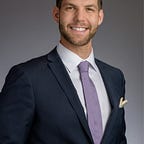Growing up AI
Artificial intelligence may be hot today, but I first heard the word “AI” when I was learning how to walk.
My father, an inventor, completed his PhD in applied mathematics and dedicated his life’s work to algorithms. In his 30 years at working at IBM and then Google, he received over 200 patents, many leading to technologies that help those with disabilities. His contributions are most notable for making speech recognition what it is today.
Although my father is completely deaf, he never let the words “disability” stand in the way of thinking creatively and achieving great things. And so, my upbringing was filled with fun, out-of-the box thinking as you might expect for an inventor’s son.
Deep Blue My Mind
In 1997 IBM revealed Deep blue, a chess super-computer that would defeat Garry Kasparov the current world champion. My dad and I were front row for the action , and I witnessed the power of AI. Afterwards, during our chess games I would imagine my brain was like Deep Blue. Even with the power of imaginary AI, I still couldn’t beat my dad. Despite getting whooped in chess, I was inspired by the potential of Deep Blue and so began a fascination with algorithms and how they could change the world.
The First Wearable Computer
Several years later, my father came home with one of the first wearable computers. It made Google Glass look like Gucci glasses. It was heavy, had poor resolution, and a short battery life, but it was still the coolest thing I’d ever seen. In the early 2000’s I was playing with technology that was still a decade from becoming mainstream.
My dad demonstrated how his latest speech recognition algorithm would transcribe audio to text, in real-time, and appear in his heads-up display. For someone who doesn’t hear, this turned the world into a movie with sub-titles. Thanks to machine learning, I was able to communicate with my dad in a way I never had before.
Big Data, Big Deal
In 2001, I first heard the words “Big Data”. My father proudly described his latest patent “The Artificial Passenger”. He told me of a system for cars that would monitor drivers’ biometrics and keep them alert if they were sleepy or distracted. In a time when computers were just learning to speak, this technology was revolutionary.
Later my dad told me about his vision of the ubicomp future, one where all computers sense their environment like humans and share that data on a network. Until then, I thought Big Data was a brand of USB key. I learned that data could be continuously collected and an analyzed to uncover patterns and relationships. The world around me never looked the same again. Sound, video, movement, and text all became packets of data that were screaming to be collected and analyzed for hidden patterns.
In 2009, I began medical school and dedicated my research ,writing and lectures to the synergy of Big Data and Medicine. Since then my Health.AI journey has led to the development of technology that can predict blood clots by listening to blood vessels, diagnose breast cancer by looking at CT-scans, and help treat burn victims. Growing up AI is not as wild as it might sound, but it did open my eyes and I haven’t closed them since.
Liked this story? Here is more stuff on Health.AI
AI in Health Roundup #13: Heat Screening for Cancer, Computer Vision for Dieting, Brain Wave Passwords
The Future of the Stethoschope, Or Not
AI in Health Roundup #12: Virtual biopsies, Digital Organs, Heart attack prevention
AI in Health Roundup #11: Diagnosing Arthritis, Ultrasound for breast cancer, Predicting psychosis for pot-smokers
AI in Health Roundup #10: Diabetes, Learning surgery, Automated facial analysis
AI in Health Roundup #9: Preventing blindness, Dental AI, Deep learning hearing aids
AI in Health Roundup #8: Predicting Dangerous Heart Rhythms, Lung cancer screening, Brain age from MRI
AI in Health Roundup #7: Liver Fibrosis, Prostate Cancer, Safer Driving
AI in Health Roundup #6: Automated colonoscopy, Disease diagnosis from breath, Prosthetic arms
AI in Health Roundup #5: Ultrasound for blood clots, Breast cancer diagnosis, and Monitoring Sleep
AI in Health Roundup #4: Robotic surgery, Brain tumor genetics, The future of Radiology
AI in Health Roundup #3: Preventing stroke, Hand gestures in surgery, Safety of health AI
AI in Health Roundup #2: Smoking cessation, Suicide prevention, Walking patterns of disease
AI in Health Roundup #1: Preventing selfie deaths, Learning from retinas, Fall detection
IOT for all with Calum McClelland
